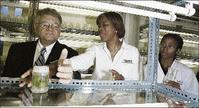
Robert Buddan POLITICS OF OUR TIME
Good governance begins with good governors. Good governors recognise, among other things, the need for good research. Good governance needs the knowledge that research brings. Take this example.
A hundred years ago (in the first decade of the 1900s), a foreign student of geology was doing research in Jamaica for his doctorate. His geology surveys convinced him that Jamaica had great potential for oil, bauxite and cement. Colonial government neither researched nor developed Jamaica's potential. That was bad governance.
regional development
A critical arm of regional development emerged when the University of the West Indies (UWI) was established. UWI celebrated its 60th anniversary last year. It held its eleventh Research Day activities a few days ago (January 29 and 30). Research Day was a reminder of the importance of research (and knowledge, more broadly) for development, and this reminder comes at a time when we are again asked to assess the payback to society from its investments in UWI and education generally.
study of natural products
UWI is involved in this research. A boring paper on enzymes might save your life if its study of natural products results in a cure for cancer, as work initiated at UWI has demonstrated. A conference on governance might sound like a lot of highfalutin talk but could lead practitioners and policymakers to give citizens better value for their money from government services.
Once the specialised sectors of the society are more aware of what UWI does, they and UWI need to develop more constructive ways of engaging with each other. UWI does not, of course, have all the knowledge but it has networks and pro-fessional contacts with other academic institutions in the country and around the world from which it can source global knowledge. This is where the hub concept becomes important.

Dr Audia Barnett, executive director, Scientific Research Council (SRC), explains the process of tissue culture technology to Industry Minister Karl Samuda in the SRC's tissue culture laboratory, while Jodi Spence (right), process development officer at the SRC, looks on. - FILE
UWI could host or organise lectures, workshops, conferences, exhibitions and events like these for practitioners across a range of professions and sectors. It could set up a database of all researchers in research institutions, public and private, academic and corporate in each and across all territories, and of the research being conducted. UWI already has its own Research for Development Bibliography of staff publications and Annual Departmental Reports of research. UWI could also provide advice to other entities about the potential for manufacturing materials being researched in the lab for various uses in the economy.
However, this requires a structure for such an engagement. And, the client organisations would have to pay for the services. But the services would be such that new ideas could boost manufacturing (such as in chemical, physics-based and biology-based products); save on costs (such as in energy alternatives, conflict resolution, and human resource management); organise entities with greater efficiencies (management and administrative sciences); establish more honesty and trust in and between organisations and clients (transparency, ethics); bring products to greater and more receptive markets (marketing and customer service), do all this in more environmentally friendly ways (ecological accounting); and globally (languages, ICT).
This engagement lends itself to network governance, which has many advantages over traditional forms of governing. UWI's form of governance is a collegial form of governance by committees on which peers act as equals; operating interdependently across different disciplines thus bringing a wide range of perspectives to governing; and which is democratic. It uses knowledge in holistic decision-making. This really ought to be the means of engagement for a new kind of economy and society.
UNLEASHING THE POTENTIAL
One of UWI's slogans is 'Unleashing the potential'. Principal Gordon Shirley pointed out last year that in its 60th year, three UWI scholars shared in the Nobel Peace Prize for their work on climate change. In our 60th year also, all seven recipients of the Jamaica Scholarship chose to study at UWI. Probably they and others will be among our future Nobel Laureates. Probably the breakthrough Nobel discoveries are already in the making. We don't have to wait for decades before the value of good research pays off in good governance, the way the young geology student's research had to.
If we make ourselves more aware and engage more effectively, we might realise UWI's payoff to society quicker and many times over. It was UWI's research and researchers that have published about the richness of Caribbean culture and society to begin with. Our educators, policymakers, managers, planners, marketers, and financiers would do well to tap into the knowledge that has been developed so that more of it can be brought to our people as citizens, clients, customers and taxpayers.
Robert Buddan lectures in the Department of Government, UWI, Mona. Email: Robert.Buddan@uwimona.edu.jm or columns@gleanerjm.com.